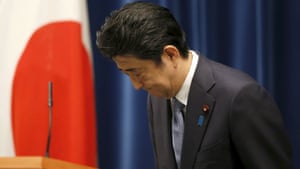Japan’s prime minister, Shinzo Abe, has expressed “deepest remorse” and “sincere condolences” to Japan’s wartime victims, but risked angering the country’s neighbours by stopping short of issuing a fresh apology and by saying that future generations should not be “predestined” to apologise themselves.
In a televised address a day before Japan marks 70 years since its defeat on 15 August 1945, Abe expressed “profound grief” for all who died in the second world war.
Abe, a conservative who had hinted he would not repeat previous official apologies, said that Japan had “repeatedly expressed the feelings of deep remorse and heartfelt apology for its actions during the war”.
“In order to manifest such feelings through concrete actions,” he said, “we have engraved in our hearts the histories of suffering of the people in Asia as our neighbours.”
But he added: “We must not let our children, grandchildren, and even further generations to come, who have nothing to do with the war, be predestined to apologise. Even so, we Japanese, across generations, must squarely face history. We have a responsibility to inherit the past, in all humbleness, and pass it on to the future.”

Abe’s departure from the landmark 1995 statement by the then prime minister, Tomiichi Murayama, in which he issued a “heartfelt apology” for Japan’s “aggression” and “colonial rule” on the Asian mainland, quickly drew criticism from China.
In a commentary, China’s state-run news agency Xinhua accused Abe of performing “linguistic tricks” in his attempts to avoid further damaging Japan’s relationship with Beijing while appeasing his conservative support base.
“Instead of offering an unambiguous apology, Abe’s statement is rife with rhetorical twists like ‘maintain our position of apology’ – dead giveaways of his deep-rooted historical revisionism, which has haunted Japan’s neighbourhood relations,” it said.
“By adding that it is unnecessary for Japan’s future generations to keep apologising, Abe seemed to say that his once-for-all apology can close the page of history. However, those countries which suffered from Japan’s aggression would never forget that dark period of history, as Japanese would always remember the horrific scenes of A-bombed Hiroshima and Nagasaki.”
South Korea’s Yonhap news agency noted that Abe had “made no new apology … falling short of South Korea’s expectations”. It added that government officials were “scrutinising” the wording of Abe’s statement.
As former victims of Japanese militarism in the first half of the 20th century, both countries had made clear that they expected Abe to repeat the key phrases of the Murayama statement, or issue a similarly unequivocal apology of his own.
“In the landmark 1995 statement, then prime minister Tomiichi Murayama voiced ‘feelings of deep remorse’ and offered a ‘heartfelt apology’ for Japan’s past ‘aggression’ and ‘colonial rule’,” Yonhap said. “A decade later, Junichiro Koizumi, who was Japan’s leader, repeated the key words. South Korea wanted Abe to follow in Koizumi’s footsteps.”
Abe did, however, refer to Japan’s past “aggression”, promising that the country would “never again resort to any form of threat or use of force as a means of settling international disputes”.
“We shall abandon colonial rule for ever and respect the right of self-determination of all peoples throughout the world,” he said.
He added: “Our country inflicted immeasurable damage on innocent people. History is harsh. What is done cannot be undone. Each and every one of them had his or her life, dreams, and beloved family. When I contemplate this obvious fact, even now, I find myself speechless and my heart is rent with the utmost grief.”
Abe acknowledged that “numerous innocent citizens” in countries that fought against Japan had suffered intolerable hardship.
In an apparent reference to Japan’s use of tens of thousands of young Asian women as sex slaves – the so-called comfort women – he said: “We must never forget that there were women behind the battlefields whose honour and dignity were severely injured.”
But his failure to acknowledge that Japanese military authorities coerced the women into working in frontline brothels – a claim he has consistently denied – is expected to provoke anger in South Korea, where most of the women were from.
Abe had promised a “forward-looking” speech that would highlight Japan’s peaceful contributions to the international community in the seven decades since the end of the war.
He said Japan had, with the help of nations such as the US and Britain, transformed itself into a free and democratic country that abided by the rule of law – praise that some interpreted as a criticism of China’s human rights record and its recent aggressive actions in the South and East China seas.
“While taking silent pride in the path we have walked as a peace-loving nation for as long as 70 years, we remain determined never to deviate from this steadfast course,” he said.
And in a remark apparently directed at critics of his attempts to give Japanese troops a wider international role – and risk being dragged into a US-led conflict – Abe later told reporters: “I want to do everything I can to prevent conflict and protect Japan.”



